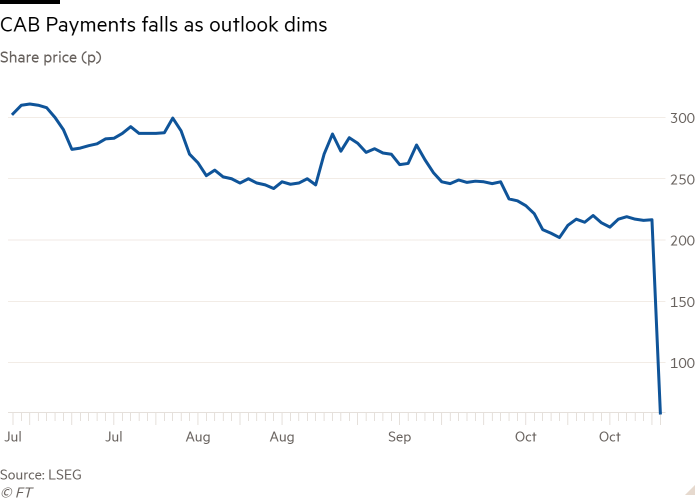Stay informed with free updates
Simply sign up to the Fintech myFT Digest — delivered directly to your inbox.
Shares in CAB Payments plunged as much as 74 per cent on Tuesday after the fintech warned on profits just months after a London listing that was hailed as a rare bright spot for the struggling UK market.
The company, which says it specialises in helping businesses make payments to “hard-to-reach markets” and has more than 490 customers, slashed its forecast for revenues this year by almost a fifth.
A steep drop in the Nigerian naira as well as recent central bank intervention in the central African franc and the west African franc have hit both profit margins and the volume of transactions, the company said.
Countries that use the three currencies, which include Cameroon, the Ivory Coast and Senegal, typically account for up to 30 per cent of CAB’s revenues in the final quarter of the year. CAB added that its revenue projections for next year would be in peril if the picture failed to improve.
CAB is also the holding company for Crown Agents Bank, a UK lender that connects emerging and frontier markets to the rest of the world, using foreign exchange and payments technology.
Analysts at Canaccord Genuity said it now “appears difficult to forecast future revenues with any degree of certainty”, helping to trigger the brutal sell-off.
Shares in CAB tumbled as much as 74 per cent to 55.6p, reducing the group’s market capitalisation to £160mn — down from the £851mn valuation it secured at its July flotation. The price recovered to 60.3p in late afternoon trading.
The warning from CAB comes six weeks after the group reported third-quarter revenues up 10 per cent. Canaccord analysts put the rapid deterioration since then to central banks reducing liquidity in the CAF and making it harder for the London-listed company to trade the WAF.
CAB’s chief executive Bhairav Trivedi told the Financial Times that the intervention by central banks was “outside management’s control” and could not have been foreseen.

Coming a month after soda ash producer WE Soda pulled its proposed $7.5bn IPO, CAB’s listing was welcomed by a market that has been hit particularly hard by the global dearth of IPOs. Excluding those for blank-cheque vehicles, CAB’s IPO was London’s largest this year.
One banker said the collapse in CAB’s shares was “an absolute disaster” for a London market trying to sharpen its appeal to companies and wrestle more IPOs from New York.
Trivedi said he had no regrets over the London listing, adding that “it was the right thing to do”. He declined to comment on the share price and said he had not considered resigning.
Africa-focused private equity group Helios Investment Partners is CAB’s largest shareholder with a 45 per cent stake, down from 72 per cent before it sold shares in the IPO. According to Bloomberg data, Fidelity Management and Research and BlackRock are the second- and third-largest shareholders, with 7.5 per cent and 6.4 per cent stakes respectively.
Helios declined to comment.
Faced with a sharp deterioration in its business, CAB said on Tuesday it would implement “cost-reduction measures and efficiencies” to cushion the impact on profits.
Gautam Pillai, analyst at Peel Hunt, described the warning as “significant” and cut his rating on the shares. He had previously rated the company a “buy” and had a target share price of 475p.
Barclays and JPMorgan were the lead advisers on CAB’s IPO while UK brokers Canaccord Genuity, Liberum Capital and Peel Hunt were joint bookrunners. Cannacord also dropped its buy rating on the shares on Tuesday.
Trivedi insisted the company still had a “robust sales pipeline” but said the tough market conditions were “going to last weeks, some months and some might last a while longer”.
With additional reporting by Ivan Levingston in London

